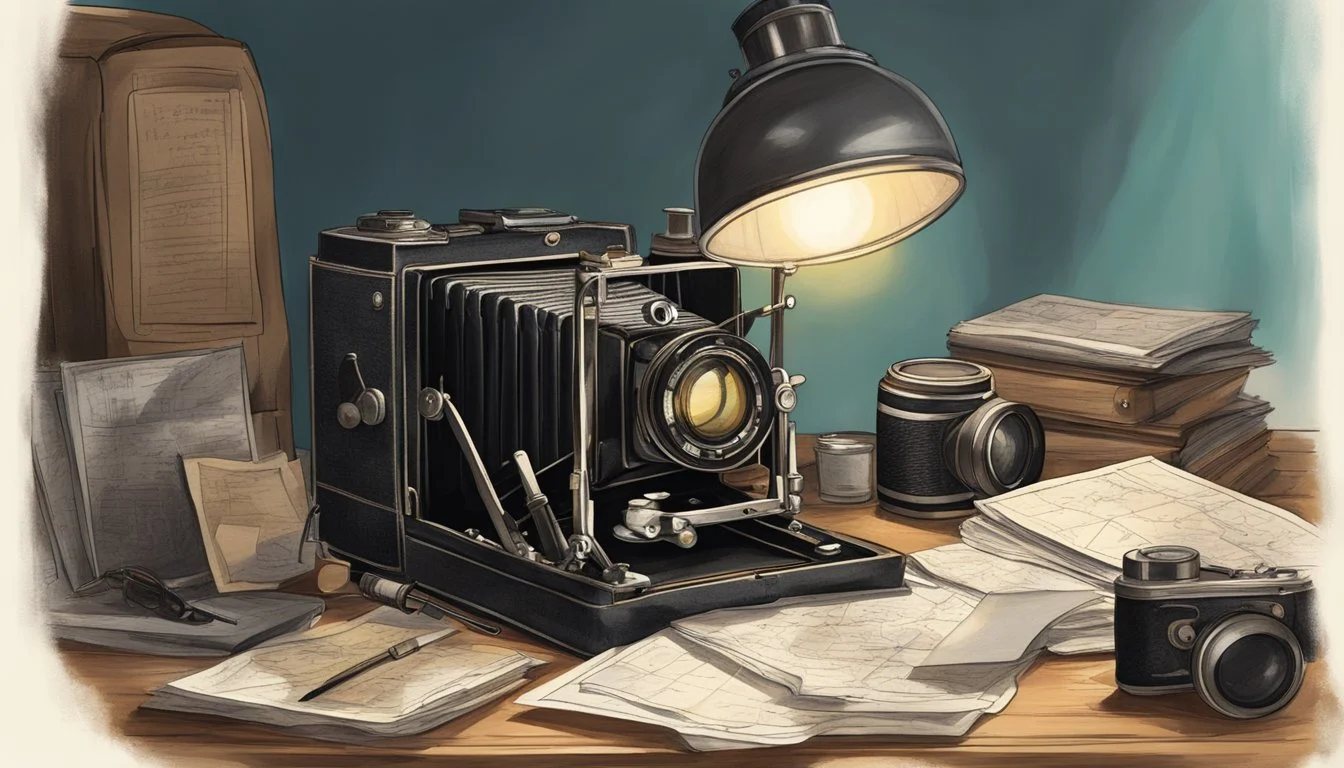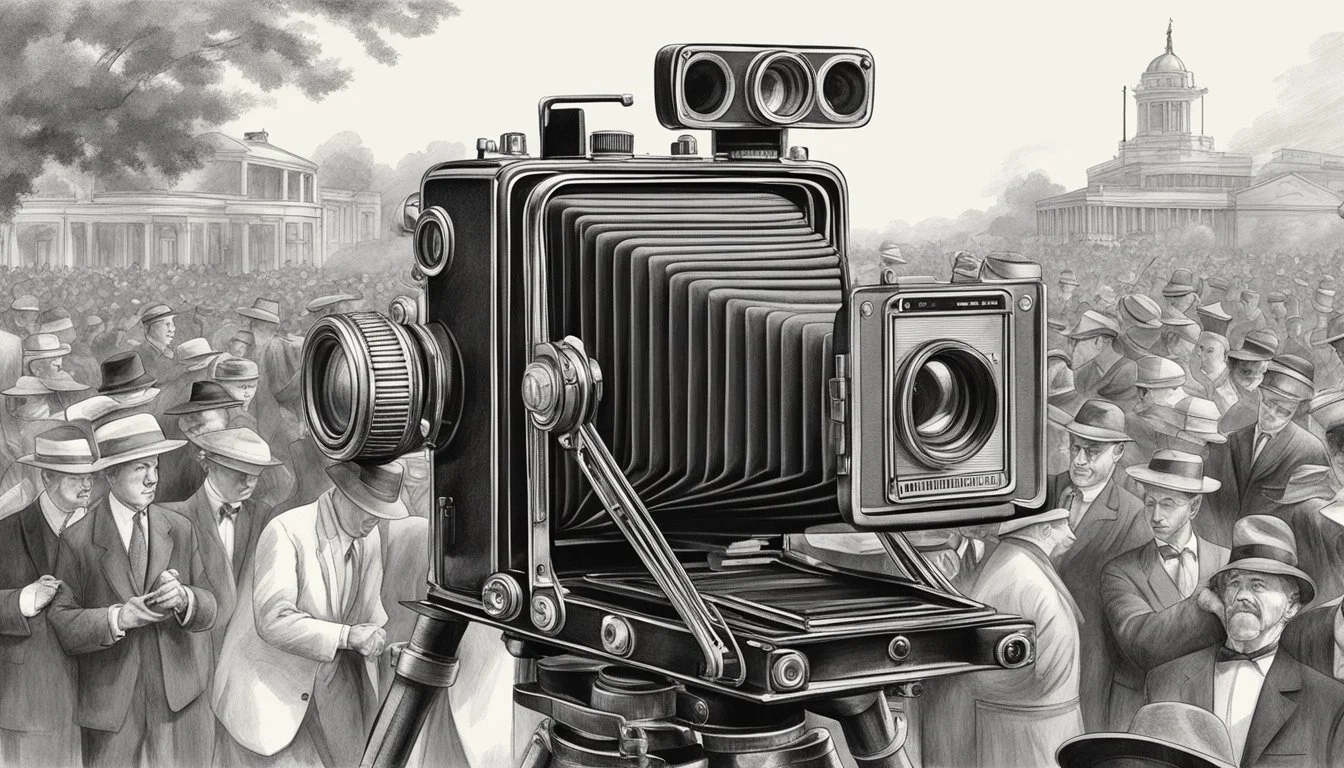Unlocking History: Ken Burns' Documentaries Redefine American Storytelling!
Ken Burns has become synonymous with powerful, thought-provoking documentary filmmaking in America. For over four decades, he has crafted meticulously researched visual narratives that bring history to life on screen. His signature style blends archival footage, photographs, music, and expert commentary to create immersive experiences that educate and inspire viewers.
Burns' collaboration with PBS has resulted in landmark series covering pivotal topics in American history and culture. His works like "The Civil War," "Baseball," and "Jazz" have garnered critical acclaim and numerous awards. These documentaries dive deep into their subjects, often spanning many hours to thoroughly explore complex historical events and figures.
The filmmaker's dedication to storytelling and historical accuracy has made his name a trusted brand in educational programming. Burns continues to produce relevant, timely documentaries that shed light on important aspects of America's past and present. His films serve as valuable resources for students, educators, and anyone seeking to better understand the forces that have shaped the nation.
The Filmmaking Journey of Ken Burns
Ken Burns transformed documentary filmmaking through his innovative techniques and deep exploration of American history. His career spans decades of acclaimed productions that have educated and moved audiences.
Early Life and Influences
Ken Burns was born on July 29, 1953, in Brooklyn, New York. His father, a cultural anthropologist, instilled in him a passion for history and storytelling. Burns studied film at Hampshire College, where he was mentored by photographers Jerome Liebling and Elaine Mayes.
His first major work, "Brooklyn Bridge" (1981), earned an Academy Award nomination for Best Documentary. This early success established Burns as a promising talent in the field.
Signature Style and Techniques
Burns developed a distinctive approach to documentary filmmaking. The "Ken Burns Effect" became his trademark, bringing still photographs to life through carefully crafted panning and zooming.
He combines archival footage, photographs, and interviews with expert narration and period music. This creates a rich, immersive experience for viewers.
Burns' films often focus on pivotal moments and figures in U.S. history. His meticulous research and storytelling skills bring these subjects to life in vivid detail.
Collaboration with PBS
Burns' partnership with PBS has been crucial to his success. Many of his documentaries are produced in association with WETA-TV and the National Endowment for the Humanities.
His landmark series "The Civil War" (1990) drew record viewership for PBS. Other notable works include "Baseball" (1994), "Jazz" (2001), and "The Vietnam War" (2017).
This collaboration has allowed Burns to tackle ambitious, multi-part series. It has also ensured his work reaches a wide audience, cementing his influence on American culture.
Notable Documentaries and Series
Ken Burns has created landmark documentaries covering pivotal moments in American history, cultural phenomena, and influential figures. His works blend archival footage, photographs, and expert interviews to craft compelling narratives.
The Civil War and American History
"The Civil War" (1990) remains Burns' most acclaimed work. This nine-part series revolutionized documentary filmmaking with its in-depth exploration of the conflict that shaped America. Burns followed this with "Baseball" (1994), an 18.5-hour epic chronicling America's national pastime.
"The Vietnam War" (2017) offered a comprehensive look at the controversial conflict. The 10-part series featured interviews with veterans, protesters, and Vietnamese citizens.
"The Roosevelts: An Intimate History" (2014) examined the lives of Theodore, Franklin, and Eleanor Roosevelt, showcasing their impact on 20th-century America.
Cultural Explorations through Music and Sports
"Jazz" (2001) traced the evolution of America's original art form across 10 episodes. The series highlighted key figures like Louis Armstrong and Duke Ellington.
"Country Music" (2019) delved into the genre's roots and development over eight episodes. It featured iconic artists such as Johnny Cash and Dolly Parton.
Burns' sports documentaries include "Jackie Robinson" (2016), which explored the life of the baseball pioneer who broke the color barrier in Major League Baseball.
Biographies of Prominent Figures
"Hemingway" (2021) offered an intimate portrait of the famous author, examining his complex life and literary legacy.
"Frank Lloyd Wright" (1998) showcased the visionary architect's innovative designs and tumultuous personal life.
"Muhammad Ali" (2021) chronicled the boxing legend's career, civil rights activism, and cultural impact in a four-part series.
Themes and Subject Matter
Ken Burns' documentaries explore pivotal moments and influential figures in American history. His films examine the complex tapestry of U.S. society, culture, and identity through carefully chosen subjects.
American Society and Culture
Burns' work often focuses on uniquely American topics that have shaped the nation's character. "Baseball" chronicles America's pastime as a reflection of larger societal changes. "Jazz" examines the evolution of this distinctly American art form alongside racial and cultural developments.
"The American Buffalo" explores the animal's significance in Native American cultures and its near-extinction due to westward expansion. "The Dust Bowl" depicts the environmental and economic disaster that reshaped the Great Plains in the 1930s.
Burns' films reveal how these cultural touchstones illuminate broader themes in American life.
War and Its Impact
Military conflicts feature prominently in Burns' oeuvre, examining their profound effects on American society. "The Civil War" provides an intimate look at the nation-defining struggle through personal letters and photographs.
"The War" chronicles World War II's impact on four American towns. "The U.S. and the Holocaust" investigates America's response to Nazi atrocities.
These works explore themes of sacrifice, national unity, and moral responsibility during times of conflict.
Biographical Works
Burns frequently uses individual lives to illuminate larger historical narratives. "Thomas Jefferson" examines the Founding Father's complex legacy and contradictions. "Benjamin Franklin" explores the polymath's role in shaping early American identity.
These biographical films delve into the personal motivations and struggles of influential figures. They reveal how individual actions can have far-reaching consequences on national events.
Burns' approach humanizes historical figures while placing them within broader social and political contexts.
Innovations in Documentary Filmmaking
Ken Burns revolutionized documentary filmmaking through his unique visual style, masterful use of music, and meticulous research methods. His techniques have influenced generations of filmmakers and changed how audiences engage with historical narratives.
Visual Style and Narrative Approach
Burns pioneered the "Ken Burns Effect" - a technique of slowly panning and zooming across still photographs. This creates a sense of motion and draws viewers into static images. He combines this with carefully selected archival footage, interviews, and voiceovers to craft compelling visual narratives.
Burns' approach weaves together multiple perspectives and voices. He often incorporates letters, diaries, and first-hand accounts read by actors. This brings historical figures to life and adds emotional depth.
His films feature a deliberate pacing that allows viewers to absorb complex information. Burns skillfully balances intimate personal stories with broader historical context.
Music and Soundtrack Integration
Music plays a crucial role in Burns' documentaries. He collaborates closely with composers to create original scores that enhance the emotional impact of visuals and narration. Burns often incorporates period music to evoke specific eras.
His use of music goes beyond background accompaniment. Songs and musical themes become integral parts of the storytelling. They help establish mood, highlight key moments, and create continuity across episodes.
Burns pays meticulous attention to sound design. He layers ambient sounds, dialogue, and music to create rich audio landscapes that immerse viewers in historical settings.
Research and Use of Archival Material
Burns and his team conduct exhaustive research for each project. They dig deep into archives, museums, and private collections to uncover rare photographs, film clips, and documents. This commitment to primary sources adds authenticity and depth to his films.
He employs teams of historians and subject matter experts to ensure accuracy. Burns often spends years researching a topic before filming begins. This thoroughness allows him to present nuanced, multifaceted views of historical events and figures.
Burns' innovative use of archival material brings forgotten voices and overlooked perspectives to light. He frequently features previously unseen photographs and footage, expanding public understanding of historical topics.
Ken Burns's Impact and Influence
Ken Burns has profoundly shaped documentary filmmaking and public understanding of American history. His innovative techniques and commitment to storytelling have left an indelible mark on the industry and popular culture.
On Modern Documentaries
The "Ken Burns Effect" revolutionized the use of archival photographs in documentaries. This technique brings still images to life through slow pans and zooms, creating a sense of movement and immediacy. Many filmmakers have adopted this style, and it's now a standard feature in video editing software.
Burns's approach to narration, combining authoritative voiceovers with first-person accounts, has become a template for historical documentaries. His use of period music and sound effects to enhance storytelling has also influenced countless filmmakers.
The success of Burns's long-form documentaries on PBS has encouraged networks and streaming platforms to invest in similar in-depth historical series.
Cultural and Educational Contributions
Burns's films have significantly impacted public knowledge of American history. His work on topics like the Civil War, jazz, and baseball has sparked renewed interest in these subjects among viewers.
Many educational institutions use Burns's documentaries as teaching tools. His films often serve as starting points for classroom discussions and further research.
Burns's emphasis on diverse voices and perspectives in American history has contributed to a more inclusive understanding of the nation's past. His documentaries often highlight previously overlooked stories and figures.
Legacy and Awards
Ken Burns has received numerous accolades for his contributions to filmmaking and historical education. These include:
Multiple Emmy Awards
Two Oscar nominations
A Lifetime Achievement Award from the Academy of Television Arts & Sciences
The Ken Burns Collection at the Library of Congress preserves his work for future generations. This archive includes not only his films but also extensive research materials and interviews.
Burns's influence extends beyond his own productions. He has mentored and inspired a new generation of documentary filmmakers, ensuring his impact will continue well into the future.
Social and Digital Media Engagement
Ken Burns has embraced digital platforms to expand the reach and impact of his documentaries. His team leverages social media and online tools to connect with audiences and distribute content across multiple channels.
Audience Engagement and Feedback
Burns and his team actively engage with viewers on social media platforms like Facebook, Twitter, and Instagram. They share behind-the-scenes content, historical facts, and clips from documentaries to spark discussions. Audience feedback is encouraged through comments, polls, and Q&A sessions.
Google Analytics and other site statistics tools help track viewer engagement and preferences. This data informs content strategy and helps tailor the digital experience for users.
Content Distribution Across Platforms
Burns' documentaries are available on PBS.org, streaming services, and YouTube. Short video clips and excerpts are shared on social media to attract new viewers.
The Ken Burns UNUM website offers curated selections from his films, organized by themes and time periods. This platform allows for personalized content discovery based on user interests.
PBS LearningMedia provides educational resources tied to Burns' documentaries for teachers and students. These materials are optimized for classroom use and digital learning environments.
Educational Initiatives and Advocacy
Ken Burns has leveraged his documentary filmmaking to advance historical education and social awareness. His work extends beyond entertainment, serving as a catalyst for educational initiatives and advocacy efforts across various topics.
Promoting Historical Awareness
Ken Burns' documentaries have brought pivotal moments in American history to life. His film on the American Revolution illuminated the nation's founding struggles, making complex historical events accessible to wide audiences. Burns' approach combines archival footage, expert interviews, and compelling narratives to engage viewers deeply with historical subjects. His works often spark public discourse and renewed interest in historical topics, encouraging viewers to explore further and contemplate the relevance of past events to present-day issues.
Contributions to Educational Resources
Burns' documentaries serve as valuable educational tools in classrooms nationwide. "College Behind Bars" spotlights the transformative power of education in prisons, showcasing the Bard Prison Initiative. This four-part series has become a resource for discussions on criminal justice reform and the importance of education in rehabilitation. Similarly, "East Lake Meadows" examines public housing and urban policy, providing insights for sociology and urban planning curricula. Burns' production company often develops supplementary materials for educators, including lesson plans and discussion guides, to facilitate the use of his documentaries in educational settings.
Collaborations and Partnerships
Ken Burns's documentary filmmaking process involves extensive collaborations with experts and partnerships with renowned institutions. These relationships enhance the depth and authenticity of his films, providing valuable insights and resources.
Work With Experts and Consultants
Burns regularly engages historians, scholars, and subject matter specialists to ensure accuracy in his documentaries. For "Defying the Nazis: The Sharps' War," he collaborated with experts on World War II history and the Holocaust. These consultants review scripts, offer historical context, and verify factual details.
Artists also play a crucial role in Burns's productions. Talented illustrators and animators bring archival photographs to life through the "Ken Burns effect" - a signature panning and zooming technique. Composers create original scores that complement the narrative and emotional tone of each film.
Partnerships with Institutions
Burns forms strategic partnerships with prestigious institutions to access archival materials and gain credibility. The Mayo Clinic collaborated on his film about the history of cancer, providing medical expertise and historical records.
PBS serves as a long-standing partner, broadcasting Burns's documentaries and supporting their production. This relationship ensures wide distribution and educational outreach for his films. Museums and historical societies often contribute rare photographs and documents, enriching the visual storytelling in Burns's work.





